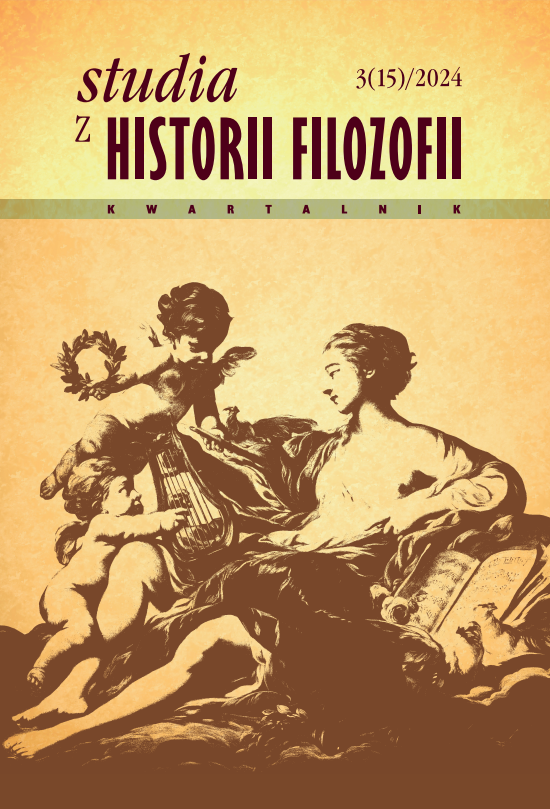Tło filozoficzne teorii percepcji Thomasa Reida
DOI:
https://doi.org/10.12775/szhf.2024.011Słowa kluczowe
Thomas Reid, perception, theory of ideas, dualismAbstrakt
The subject of this article is not explicity the theory of perception that Reid propounded. To present it would go beyond his modest framework because an essential part of Reid's view was the so-called common sense principles. The nature, number and cognition role of these principles would require a separate discussion. In this text, therefore, I concentrate on the specific preliminaries of the philosophy proposed by the founder of the Scottish school of common sense, which can be interpreted as a "negative reference point", which is the starting point for "positive" solutions, i.e. Reid's proposed theory of perception. He thus began with a critique of the "theory of ideas", which, in Reid's view, was the main reason for the failure to formulate a satisfactory philosophy of mind. Within this critique, we find his reflections on the method of philosophising itself, the differences that occur in the study of such different objects as material objects and cognitive mind, and his interpretation of the consequences of the adaption of the theory of ideas by the philosophers of modernity. The result of Reid's theoretical analyses is the rejection of the assumption of any mutual interaction between matter and mind, the questioning of the possibility of perception of material objects based on similarity of sense impressions and the things perceived, and the accusation of the proponents of this theory of dooming philosophy to idealism and scepticism.
Bibliografia
Arnauld Antoine. 1990. On True and False Ideas, przeł. Stephen Gaukroger. Manchester–New York: Manchester University Press.
Atherton Margaret. 1984. „«Suppose I am Pricked with a Pin»: Locke, Reid and the Implications of Representationalism”. Pacific Philosophical Quarterly 65: 149–165.
Ayers Michael R. 1998. „Introduction”. W: George Berkeley. Philosophical Works. Including the Works on Vision. London–Vermont: Everyman.
Ayers Michael R. 1998. Locke. Idee i rzeczy, przeł. Samanta Stecko. Warszawa: Amber.
Buras Todd. 2015. „Thomas Reid’s Experimentum Crucis”. W: Thomas Reid on Mind, Knowledge and Value, red. Rebecca Copenhaver, Todd Buras, 14–34. Oxford: Oxford University Press.
Buras Todd. 2019. „Thomas Reid’s Philosophy of Mind”. W: Philosophy of Mind in the Early Modern and Modern Ages, red. Rebecca Copenhaver. London–New York: Routledge.
Grzeliński Adam. 2019. Doświadczenie i rozum. Empiryzm Johna Locke’a. Toruń: Wydawnictwo Naukowe UMK.
Hamilton William. 1983. „On the Various Theories of External Perception”. W: Thomas Reid, Philosophical Works. With notes and supplementary dissertations by Sir William Hamilton, t. 1–2, 816–824. Hildesheim–Zürich–New York: Georg Olms Verlag.
Hempoliński Michał. 1966. U źródeł filozofii zdrowego rozsądku. Thomasa Reida teoria spostrzeżenia zmysłowego. Warszawa: PWN.
Lehrer Keith. 1991. Thomas Reid. London–New York: Routledge.
Locke John. 1955. Rozważania dotyczące rozumu ludzkiego, przeł. Bolesław Gawecki, t. 1–2. Kraków: PWN.
Nichols Ryan. 2007. Thomas Reid’s Theory of Perception. Oxford: Clarendon Press.
Reid Thomas. 1975. Rozważania o władzach poznawczych człowieka, przeł. Michał Hempoliński. Warszawa: PWN.
Reid Thomas. 1983. An Inquiry into the Human Mind on the Principles of Common Sense. W: Thomas Reid, Philosophical Works. With notes and supplementary dissertations by Sir William Hamilton, vol. 1–2. Hildesheim–Zürich–New York: Georg Olms Verlag.
Reid Thomas. 1983. Essays on the Intellectual Powers of Man. W: Thomas Reid, Philosophical Works. With notes and supplementary dissertations by Sir William Hamilton, vol. 1–2. Hildesheim–Zürich–New York: Georg Olms Verlag.
Reid Thomas. 1997. An Inquiry into the Human Mind on the Principles of Common Sense. A Critical Edition, red. Derek R. Brookes. University Park, Pennsylvania: The Pennsylvania State University Press.
Wolterstorff Nicholas. 2001. Thomas Reid and the Story of Epistemology. Cambridge: Cambridge University Press.
Yolton John. 1984. Perceptual Acquaintance. From Descartes to Reid. Minneapolis: University of Minnesota Press.
Yolton John. 1993. A Locke Dictionary. Oxford: Blackwell Publishers.
Pobrania
Opublikowane
Jak cytować
Numer
Dział
Licencja

Utwór dostępny jest na licencji Creative Commons Uznanie autorstwa – Bez utworów zależnych 4.0 Międzynarodowe.
Statystyki
Liczba wyświetleń i pobrań: 322
Liczba cytowań: 0



